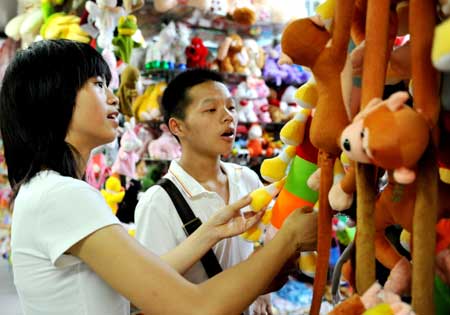Economy
Young entrepreneurs find starting up a hard sell
By Duan Yan and He Dan (China Daily)
Updated: 2010-09-15 11:13
 |
Large Medium Small |
|
 |
|
Two students browse for supplies to sell on their online store at the international trade center in Yiwu, Zhejiang province, Graduates were encouraged to start their own businesses to ease the burden on China's job market. Zhang Jiancheng / for China Daily |
Ask Zhao why he wanted to open a restaurant and he will readily admit a big factor was the prospect of taking vacations whenever he liked.
However, after enduring a tough first year in business, largely due to his partners' lack of knowledge about the industry, going on holiday is now the last thing on his mind.
After failing to get a business license from the local authorities before the National Day holiday, Yunhaiyao did not open until late October, thereby missing the annual tourist peak.
The long, harsh winter that followed also proved disastrous, despite many promotions to lure in customers.
"We were losing up to 6,000 yuan a day," said Zhao. "All we could do was read the weather forecasts and hope a rise in temperature would bring more customers."
Officials in cities such as Guangzhou, capital of Guangdong province, and Changsha, capital of Hunan province, have vowed to simplify the application process for business licenses, while in Beijing some fees are waived for recent graduates.
"It saved us a few hundred yuan, which is nothing compared to what we paid out originally," said Zhao, who complained that his biggest concern is the bureaucracy.
"The health bureau, the fire bureau, the labor bureau," he said as he counted on his fingers how many departments he has to deal with. "There are at least seven or eight."
Due to the difficulty in getting business licenses, college graduates who sell goods online or on the street often go without cutting down on the paperwork.
Li Qintao, a fashion design major who graduated from Shenzhen University in July last year, began hawking clothes to migrant workers outside factories in the Bao'an district of Shenzhen. All he has to pay is the occasional 10 or 15 yuan to set up his stall.
"Sometimes they're villagers who come for the money, sometimes they're street gangsters. They just turn up and collect the fee," he said.
With only 3,000 yuan in seed money, Li earned 500 yuan in his first month, which covered his apartment rent and bills.
"My parents want me to find a more stable job, to be a teacher or work for the government," he said. "I want to prove them wrong and be successful."